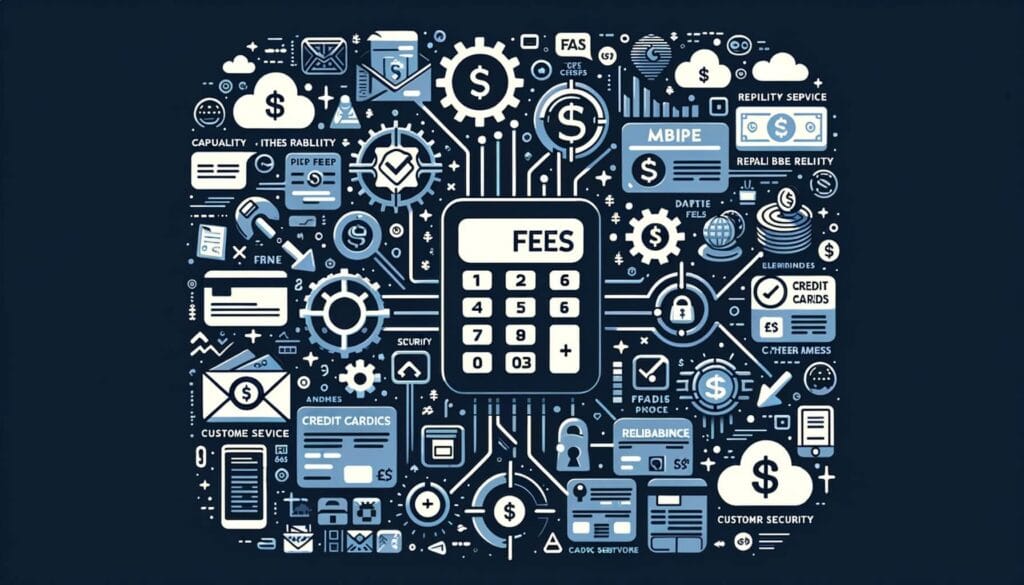
By Harriet Forster January 1, 2025
In today’s digital age, credit card processing has become an essential part of running a business. Whether you operate a brick-and-mortar store or an online business, accepting credit card payments is crucial for attracting customers and increasing sales. However, many business owners find themselves overpaying for credit card processing without even realizing it.
In this comprehensive guide, we will explore the various factors to consider when choosing a credit card processor, tips for negotiating rates and fees, hidden costs to watch out for, and how to optimize your payment processing system for cost efficiency.
Factors to Consider When Choosing a Credit Card Processor

Choosing the right credit card processor is crucial for your business’s success. With so many options available, it can be overwhelming to determine which one is the best fit for your specific needs. Here are some factors to consider when making this important decision:
1. Pricing Structure: Different credit card processors have different pricing structures, including flat-rate pricing, interchange-plus pricing, and tiered pricing. Understanding these pricing models and their associated costs is essential for making an informed decision.
2. Transaction Fees: Transaction fees can vary significantly between credit card processors. It’s important to compare these fees and consider how they will impact your business’s profitability.
3. Contract Terms: Some credit card processors require long-term contracts with hefty cancellation fees. Others offer month-to-month agreements with no cancellation fees. Carefully review the contract terms to avoid getting locked into an unfavorable agreement.
4. Integration Options: If you operate an online business, it’s crucial to choose a credit card processor that seamlessly integrates with your e-commerce platform. This will ensure a smooth and efficient payment process for your customers.
5. Customer Support: Reliable customer support is essential when it comes to credit card processing. Look for a processor that offers 24/7 support and has a reputation for excellent customer service.
Negotiating Rates and Fees: Tips for Getting the Best Deal

Once you have narrowed down your options and identified a credit card processor that meets your needs, it’s time to negotiate rates and fees. Here are some tips for getting the best deal:
1. Do Your Research: Before entering into negotiations, research the average rates and fees in the industry. This will give you a benchmark to compare against and help you determine if the processor’s initial offer is fair.
2. Leverage Competition: Don’t be afraid to play credit card processors against each other. If you have received a competitive offer from one processor, use it as leverage to negotiate better rates and fees with another.
3. Understand Interchange Fees: Interchange fees are the fees charged by credit card networks for processing transactions. Understanding how these fees work and how they impact your business can give you leverage in negotiations.
4. Consider Volume and Average Ticket Size: If your business processes a high volume of transactions or has a high average ticket size, you may be able to negotiate lower rates and fees. Credit card processors are often willing to offer discounts to businesses that bring in significant revenue.
Hidden Costs to Watch Out For in Credit Card Processing

While credit card processors may advertise low rates and fees, there are often hidden costs that can add up quickly. Here are some hidden costs to watch out for:
1. PCI Compliance Fees: Payment Card Industry (PCI) compliance is a set of security standards that businesses must adhere to when accepting credit card payments. Some processors charge additional fees for PCI compliance, so be sure to inquire about these costs upfront.
2. Early Termination Fees: As mentioned earlier, some credit card processors require long-term contracts with hefty cancellation fees. If you decide to switch processors before the contract term is up, you could be hit with significant penalties.
3. Equipment Costs: If you need to purchase or lease credit card processing equipment, be aware that some processors may charge inflated prices or lock you into long-term equipment leases with high monthly fees.
4. Chargeback Fees: Chargebacks occur when a customer disputes a credit card transaction. Some processors charge fees for each chargeback, which can quickly eat into your profits.
Understanding Interchange Fees and How They Impact Your Business

Interchange fees are a significant component of credit card processing costs. These fees are set by credit card networks like Visa and Mastercard and are paid by the merchant to the card-issuing bank. Understanding how interchange fees work and how they impact your business is crucial for managing your credit card processing costs effectively.
Interchange fees are determined based on various factors, including the type of card used (debit, credit, rewards, etc.), the transaction method (swiped, keyed-in, online), and the industry in which the merchant operates. These fees can range from a few cents to several percentage points of the transaction amount.
To minimize interchange fees, it’s important to understand the different categories and rates associated with each type of transaction. For example, swiping a debit card will typically result in lower interchange fees compared to a credit card transaction. By encouraging customers to use debit cards or implementing strategies to reduce the number of credit card transactions, you can effectively lower your interchange fees.
Exploring Different Types of Credit Card Processing Solutions
When it comes to credit card processing, there are several different solutions available. Understanding the pros and cons of each can help you choose the best option for your business. Here are some common types of credit card processing solutions:
1. Traditional Merchant Accounts: A traditional merchant account is a type of credit card processing solution that requires a business to establish a relationship with a merchant bank. This option offers more flexibility and customization but may come with higher fees and longer setup times.
2. Payment Service Providers: Payment service providers (PSPs) like PayPal and Stripe offer all-in-one solutions for businesses looking to accept credit card payments. These providers handle the entire payment process, including payment gateway integration, transaction processing, and security. PSPs are often easy to set up and have competitive pricing, making them a popular choice for small businesses and startups.
3. Mobile Payment Solutions: With the rise of smartphones, mobile payment solutions have become increasingly popular. These solutions allow businesses to accept credit card payments using a mobile device or tablet. Mobile payment solutions are convenient and often have lower fees compared to traditional options.
Tips for Avoiding Common Credit Card Processing Scams
Unfortunately, the credit card processing industry is not immune to scams and fraudulent practices. Here are some tips for avoiding common credit card processing scams:
1. Research the Processor: Before signing up with a credit card processor, thoroughly research their reputation and read reviews from other merchants. Look for any red flags or complaints about hidden fees, poor customer service, or unethical practices.
2. Be Wary of Unsolicited Offers: If you receive unsolicited offers from credit card processors promising incredibly low rates or guaranteed savings, proceed with caution. Legitimate processors typically do not engage in aggressive marketing tactics.
3. Read the Fine Print: Always read the contract and terms of service carefully before signing up with a credit card processor. Pay close attention to any clauses that could result in hidden fees or unfavorable terms.
4. Trust Your Instincts: If something feels too good to be true, it probably is. Trust your instincts and be cautious when dealing with credit card processors that make unrealistic promises or pressure you into signing up.
How to Optimize Your Payment Processing System for Cost Efficiency
Optimizing your payment processing system for cost efficiency can help you save money and increase your bottom line. Here are some tips to consider:
1. Review Your Statements Regularly: Take the time to review your credit card processing statements regularly. Look for any discrepancies or unexpected fees and address them promptly.
2. Streamline Your Payment Process: A streamlined payment process can save you time and money. Consider implementing technologies like contactless payments, mobile wallets, or recurring billing to simplify the payment process for your customers.
3. Invest in Fraud Prevention Measures: Fraudulent transactions can result in chargebacks and additional fees. Investing in fraud prevention measures, such as address verification systems and card security codes, can help reduce the risk of fraud and save you money in the long run.
4. Leverage Data Analytics: Utilize data analytics to gain insights into your customers’ purchasing behavior and payment preferences. This information can help you optimize your payment processing system and tailor your offerings to meet customer demands.
Frequently Asked Questions about Credit Card Processing
Q1. What is a payment gateway, and why is it important for credit card processing?
A payment gateway is a technology that securely connects your website or point-of-sale system to the credit card networks. It encrypts sensitive customer data and facilitates the authorization and settlement of credit card transactions. A reliable payment gateway is crucial for ensuring the security and efficiency of your credit card processing.
Q2. Can I negotiate interchange fees with credit card networks?
Interchange fees are set by credit card networks and cannot be directly negotiated. However, you can indirectly influence your interchange fees by implementing strategies to encourage lower-cost transaction types, such as debit card usage.
Q3. Are there any alternatives to traditional credit card processing?
Yes, there are alternative payment methods available, such as digital wallets (e.g., Apple Pay, Google Pay), cryptocurrency, and ACH (Automated Clearing House) transfers. These options may have lower fees or offer additional benefits, but it’s important to consider customer preferences and adoption rates before implementing them.
Q4. How can I protect my business from credit card fraud?
To protect your business from credit card fraud, implement security measures such as PCI compliance, address verification systems, and card security codes. Additionally, monitor transactions for suspicious activity and educate your staff on how to identify and handle potentially fraudulent transactions.
Conclusion
Credit card processing is an essential aspect of running a business in today’s digital world. By understanding the basics of credit card processing, considering the factors when choosing a credit card processor, negotiating rates and fees, and being aware of hidden costs, you can avoid overpaying for credit card processing.
Additionally, understanding interchange fees, exploring different types of credit card processing solutions, and implementing strategies to avoid scams can further optimize your payment processing system for cost efficiency. By following these guidelines and staying informed about the latest trends and technologies in credit card processing, you can ensure that your business is maximizing its profitability while providing a seamless payment experience for your customers.